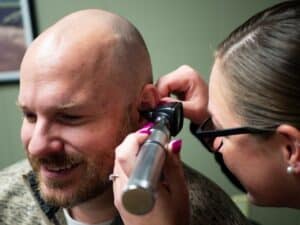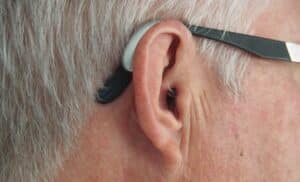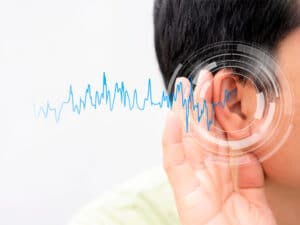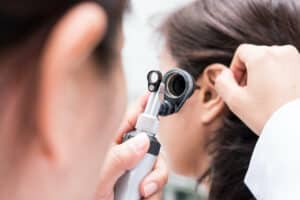Hearing, a vital sense often taken for granted, plays a crucial role in our daily lives. Yet, the prevalence of hearing loss is on the rise, impacting individuals across diverse age groups and backgrounds. Understanding the significance of healthy hearing is the first step in dispelling the common myths about hearing loss.
The aim here is not just to provide information but also to challenge preconceived notions about hearing loss. By debunking common myths, we hope to foster a broader awareness of hearing health and encourage proactive measures. From stereotypes about its demographics to misguided beliefs about prevention, each myth will be dissected, offering a fresh perspective on an issue that affects millions.
5 Common Myths About Hearing Loss
Myth 1: Only the Elderly Experience Hearing Loss
Contrary to popular belief, hearing loss isn’t an exclusive companion of the elderly. Startling statistics reveal a surge in cases among younger individuals, highlighting the urgency of dispelling the notion that it’s a concern reserved for later stages in life. Understanding the numbers is key to dismantling this pervasive myth.
Beyond the natural aging process, factors like exposure to loud environments and underlying health conditions are contributing to this widespread issue. The other causes of hearing loss aside from age include:
- Noise-induced exposure
- Genetics
- Ear infections
- Head injuries
- Medications
- Occupational hazards
- Malformation of the ear
- Tumors
- Autoimmune diseases
- Viral or bacterial infections
- Meniere’s disease
- Otosclerosis
- Traumatic events (explosions, loud blasts)
- Eardrum damage
- Excessive earwax
The Importance of Early Detection
“It won’t happen to me” is a belief that often delays seeking help. However, early detection is a game-changer in managing and mitigating the impact of hearing loss, allowing for timely interventions that can significantly improve outcomes and quality of life.
Myth #2: Hearing Aids Are Only for the Profoundly Deaf
One of the common myths about hearing loss is that hearing aids are only made for people who are profoundly deaf. This reinforces the false belief that these gadgets don’t help people with milder hearing problems. It keeps a lot of people from getting help early on and keeps people from learning about all the different ways hearing aids can be used.
Early intervention with hearing aids, even in cases of mild to moderate hearing loss, offers significant advantages. These devices enhance overall sound perception, making conversations clearer and improving communication. Moreover, early use of hearing aids can prevent the social and cognitive consequences often associated with untreated hearing loss, promoting a more fulfilling and engaged lifestyle.
Different Types of Hearing Aids Available
Various hearing aids in Westchester, NY, cater to different needs and preferences. Behind-the-ear (BTE) and in-the-ear (ITE) styles provide options for varying comfort levels. Open-fit hearing aids allow for natural sound transmission, while completely-in-canal (CIC) aids offer discreetness. Technological advancements have led to the development of smart hearing aids equipped with features like noise reduction and connectivity to devices. Understanding the diverse range of hearing aids underscores their versatility and suitability for various degrees of hearing loss.
Myth #3: Hearing Aids and Cochlear Implants Restore Hearing to Normal
A common misconception surrounding hearing aids and cochlear implants is that they can fully restore hearing to a “normal” state. However, the reality is more nuanced. Unlike glasses that can often restore normal vision, hearing aids and cochlear implants serve to enhance auditory experiences but do not bring hearing back to an equivalent of “normal.”
Understanding the Limitations of Hearing Devices
Hearing aids function by amplifying sounds, increasing volume, and, to some extent, providing clarity at specific frequencies. While they significantly improve hearing, they don’t replicate the intricacies of natural hearing.
Similar to this, cochlear implants, while groundbreaking, offer varying degrees of improvement depending on the person’s hearing history, length of deafness, and age at implantation. It’s important to manage expectations and recognize that the results are not synonymous with achieving “normal” hearing.
Challenges Faced Despite Device Usage
People with hearing loss, even with the aid of these devices, may encounter challenges. Though they can understand and respond in many situations, there may be instances where important information is missed. The effort required to listen intently for prolonged periods can also be exhausting. Dispelling this myth involves fostering realistic expectations about the capabilities of hearing aids and cochlear implants, acknowledging the valuable enhancements they offer while recognizing their limitations.
Myth #4: Hearing Loss is Untreatable
Many people hold the misconception that once hearing is lost, it’s lost forever. However, reality is far from this belief. Numerous treatments are available that can significantly improve hearing and enhance the overall auditory experience.
Available Treatments for Hearing Loss

One of the most common solutions is the use of hearing aids. These small but powerful devices are designed to amplify sounds, making them clearer and more audible. Additionally, for individuals with severe hearing impairment, cochlear implants provide a surgical option that can restore a sense of hearing.
Assistive listening devices, ranging from simple amplifiers to advanced technologies, further contribute to managing and improving hearing. In some cases, medications may also be prescribed to address underlying issues causing hearing loss.
Seeking Professional Help
It is crucial for individuals experiencing hearing loss to seek professional help. Audiologists, trained specialists in hearing healthcare, conduct thorough assessments to understand the specific challenges faced by each individual. Based on these assessments, they can create customized treatment plans, ensuring that the chosen interventions align with the unique needs of the patient.
Technological Advancements in Hearing Loss Treatment
Advancements in technology have played a significant role in transforming the landscape of hearing loss treatment . Smart hearing aids, for instance, come equipped with innovative features that can be personalized to the user’s preferences. Moreover, connectivity features allow these devices to integrate seamlessly with smartphones, enhancing adaptability and convenience.
Myth #5: Hearing Loss Only Affects the Ears
Another one of the common myths about hearing loss is that it only affects the ears. In reality, it affects the whole body. Even though the ears are very complicated, they are linked to bigger parts of our health.
In fact, hearing loss goes beyond affecting our ability to perceive sounds. It intertwines with mental health and cognitive function. Research shows that people who don’t treat their hearing loss are more likely to develop conditions like depression and cognitive decline.
Lifestyle Changes and Habits to Protect Hearing
Adopting lifestyle changes and habits can protect against hearing loss. These include:
- Limiting Exposure to Loud Noise: Minimizing time in noisy environments reduces the risk of noise-induced hearing loss.
- Using Hearing Protection: Employing earplugs or earmuffs in loud settings safeguards against potential damage.
- Balanced Diet and Regular Exercise: Maintaining overall health contributes to robust auditory well-being.
- Regular Hearing Check-ups: Periodic assessments help monitor and address any emerging issues, contributing to long-term hearing health.
Take the First Step Towards Clearer Hearing with Listen Hear Diagnostics
At Listen Hear Diagnostics in Westchester, we prioritize hearing health, providing personalized care tailored to your unique needs. Our goal is to improve your hearing and raise your quality of life under the direction of Dr. Emily M. Esca, a dedicated audiologist in Westchester with extensive experience in the field.

Why Choose Listen Hear Diagnostics?
- Comprehensive Hearing Evaluations: Our advanced diagnostic assessments ensure a thorough understanding of your hearing profile.
- Cutting-Edge Hearing Aids: Explore a range of state-of-the-art hearing aids designed to enhance your auditory experience.
- Effective Tinnitus Management: Find solutions for managing tinnitus, customized to address your specific needs.
Embrace a life filled with clear and vibrant sounds. Trust Listen Hear Diagnostics for your hearing health journey. Schedule your appointment today and take the first step towards rediscovering the joy of hearing.








